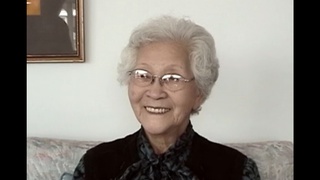Interviews
Taiko as a family tradition
Taiko, originally for me when I first got involved with it, it was fun and something my family did. So, it was just a given that we would become involved. I never really thought of it as a tradition at that time. And in fact, my husband brought it up when we were dating, and he recognized that I had such a commitment during the summer months to taiko and involvement in it that he brought it up once. And he said, “There’s this tradition that you see to continue in your family.” And I kind of thought about, and I thought, “I guess.” I never really thought about it as a tradition.
And I was then very grateful to him because he has really embraced, not only having joined and learning taiko, but making a commitment to it and seeing that the group continues. Of course, now having our son being committed to it also is pretty special. So, as you progress in your taiko experiences, the meaning of taiko and what it brings to you personally becomes different as time goes on. And I’ve noticed that in our players as well.
Date: July 9, 2004
Location: Hawaii, US
Interviewer: Art Hansen, Sojin Kim
Contributed by: Watase Media Arts Center, Japanese American National Museum




